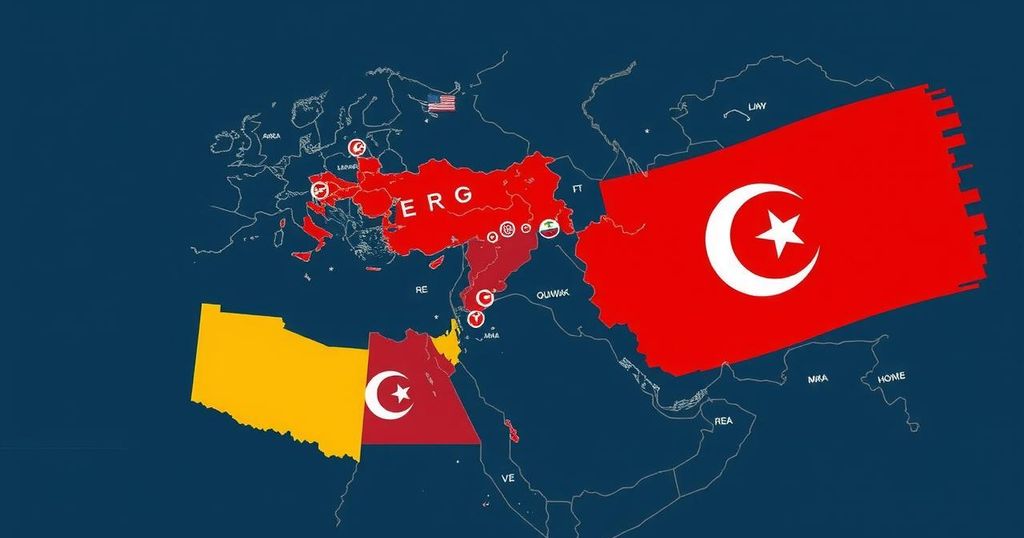The Implications of the US Election on Middle Eastern Affairs: A Focus on Israeli Interests
The U.S. election is poised to significantly influence the Middle East, particularly Israel’s relationship with either candidate. Donald Trump, having previously recognized Israeli sovereignty in the Golan Heights and facilitated normalization with Arab nations, retains strong support in Israel. In contrast, Kamala Harris’s calls for humanitarian considerations and ceasefires have garnered less favor. The candidates differ in their approaches to Iran and Palestinian statehood, highlighting the nuances shaping their foreign policy strategies and their potential impacts on regional stability.
The potential implications of the upcoming United States election on the Middle East, particularly concerning Israel, are significant and multifaceted. When Donald Trump was last president, he received notable support from Israeli Prime Minister Benjamin Netanyahu, who even commemorated him by naming a settlement in the Golan Heights ‘Trump Heights.’ This unprecedented recognition stemmed from Trump’s departure from longstanding U.S. foreign policy by acknowledging Israel’s claims to the Golan Heights, which were taken from Syria during the 1967 war. Residents of these areas, such as Elik Goldberg, express deep concerns about the ongoing conflict, particularly following the Hamas attacks on October 7th, which have elevated tensions with Hezbollah along the Lebanese border. The sentiment among these individuals is clear: they seek solid support from the new U.S. administration to affirm Israel’s security and interests. Historically, Trump has been seen as a robust ally for Israel, having dismantled the Iran nuclear deal, facilitating normalization agreements between Israel and several Arab nations, and recognizing Jerusalem as Israel’s capital, actions that resonated well with the Israeli populace, with recent polls indicating that approximately two-thirds favor his return to office. In contrast, Vice President Kamala Harris has faced scrutiny for her previous comments perceived as critical of Israel, which has reduced her favorability among many Israelis. Her approach emphasizes humanitarian issues and calls for a ceasefire in Gaza, creating a stark contrast with Trump’s more hawkish stance that prioritizes military victory for Israel. Despite the differing perspectives, both candidates seem to share similar objectives concerning Iran, with discussions underway to forge a new approach to contain Iran’s nuclear ambitions and expand normalization agreements with Arab states, particularly Saudi Arabia. The main divergence lies in their methods; Harris tends to favor a grassroots approach to conflict resolution, while Trump is perceived as advocating for a more top-down strategy. As speculation regarding the election outcome continues, it is clear that the sentiments in Israel towards the candidates may heavily influence U.S.-Israeli relations going forward, with personal dynamics and public perceptions playing crucial roles alongside traditional geopolitical interests.
The backdrop of this discussion involves the significant geopolitical dynamics in the Middle East, particularly how the U.S. presidential elections can shift foreign policy paradigms. Trump’s previous tenure saw historic moves that altered the U.S.-Israel relationship, fostering a unique bond with Netanyahu that resonated strongly with the Israeli public. Conversely, concerns regarding humanitarian crises in Gaza and the stance towards Palestinians have become increasingly prominent in U.S. politics, shifting some public opinion against Israeli policies.
In conclusion, the outcome of the U.S. elections on November 5 has the potential to reshape the Middle Eastern geopolitical landscape significantly, particularly regarding U.S.-Israel relations and the broader issues concerning Palestinians. The contrasting approaches of the candidates reflect divergent philosophies that could lead to fundamentally different foreign policy inquiries in the region. The Israeli populace’s strong preference for Trump indicates a clear desire for continuity in U.S. support aligned with their security concerns, while tensions simmer regarding the humanitarian implications of military actions in Gaza, highlighting the complexity of Middle Eastern politics today.
Original Source: www.bbc.com




Post Comment